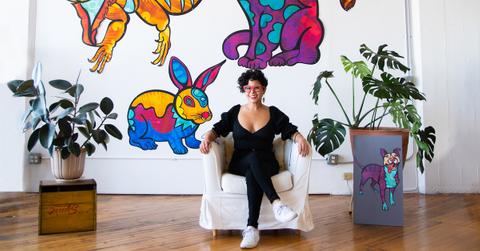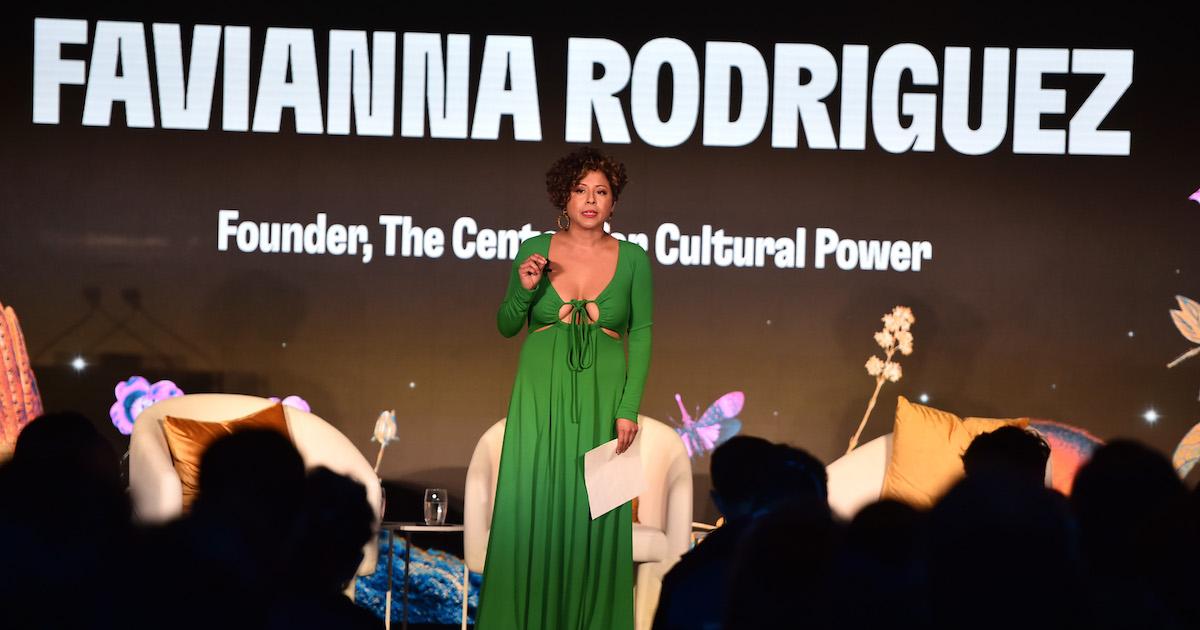Favianna Rodriguez on the Intersection of Art, Social Change, and Climate Action (Exclusive)
Published Jan. 17 2023, 5:02 p.m. ET

“When our stories become so abundant, and you see art that is so abundant that it becomes the new normal — that's when policies then will start to flow, because people's minds have shifted,” Favianna Rodriguez tells Green Matters on a recent video call.
Rodriguez is the co-founder and president of The Center for Cultural Power, a nonprofit led by women artists of color, across various mediums. The organization works to mobilize artists and storytellers to envision an equitable society, in which people and nature are respected; it also trains and financially supports artists on this mission, operating under the strategy “artists are a critical force to achieve social change.”
Keep reading to learn more about Rodriguez’s story, the center, and how art can be used as a powerful tool in the fight for climate and social justice.

Favianna Rodriguez speaks onstage during the Good Energy Playbook event on April 19, 2022 in Los Angeles.
Favianna Rodriguez has always been inspired by meaningful art and activism.
Favianna Rodriguez, 44, is a first-generation American Latinx artist with Afro-Peruvian roots. She grew up in East Oakland, Calif., where her home was located right near a freeway, and asthma was common in her polluted neighborhood.
“We actually lived right next to a freeway. And 2 miles up, there's another freeway that white neighbors organized to not have trucks go through,” she tells us. “So my community faces a disproportionate amount of fossil fuel emissions. And it's been like that since 1970 … My whole life I've really seen the impacts of how people of color are relegated to dirty communities.”
So years ago, when she realized that the fossil fuel industry was at the center of many of the injustices she had witnessed, she decidedly became an environmentalist; she then began making the connection between climate justice and other important social issues, including racial justice and gender justice.
All the while, Rodriguez was embracing her artistic side, having been involved in community art classes since around the age of 10.
“I got into art because honestly, my community was facing a lot of violence,” Rodriguez says. She remembers taking in hip hop music, local artistic murals, and the work of the Black Panther Party, which provided her comfort amidst all the goings on of the war on drugs.
“I felt that through art, I could … tell a different story,” she says. While in college at UC Berkeley, she realized that technology would soon become a major player in the art world, and so she learned how to code. She then dropped out, and became an entrepreneur, founding her first startup in 1999.
Favianna Rodriguez founded The Center for Cultural Power to invest in artists and storytellers.
The Center for Cultural Power is actually the fifth startup Rodriguez founded — and she was inspired to do so after learning about the work of civil rights artists such as Bobby Seale and Amiri Baraka, as well as the Black Panthers and the Brown Berets.
“I was learning from that generation before, but that generation didn't leave cultural infrastructure for my generation. So this is why I started The Center for Cultural Power,” she says.
“It's just not okay that we live in a white man art world, and we need to shift that,” Rodriguez explains. “So The Center for Cultural Power, to me, represents both cultural equity … as well as leveraging the power of art to change realities and to change policy.”
The Center for Cultural Power is constantly offering new fellowships, training sessions, activations, and other programs that help combine strategy with the power of art, addressing issues including climate change, migration, gender, sexuality, and racial justice.
In fact, in the year 2022, the center trained more than 350 artists on activism and social change. If you are interested in getting involved, check out The Center for Cultural Power’s programs page, as well as the center's Good Energy Playbook for screenwriters.
Rodriguez believes hope is key in the world of climate action.
Though being so immersed in the world of climate action and fighting for social justice can feel a bit gloomy and lead to feelings of grief, Rodriguez remains hopeful about the future of our planet, and tries to focus on the positives.
“As an artist, I know that the most important thing that I can do is tap people's imagination, and that we must inspire people,” she says.
“Artists … get to play in the full human spectrum of emotions,” she continues. “I think it's important that we feel all the emotions, but I think that as an artist, fantasy, futurism, and the imagination are huge, huge opportunities to win.”